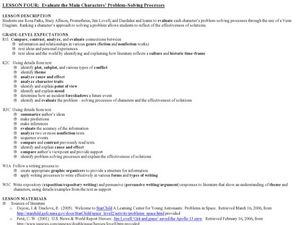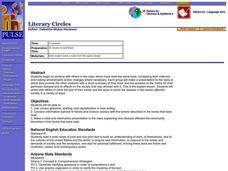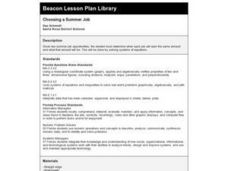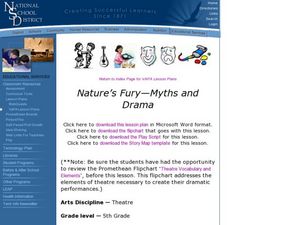Curated OER
Earth and Space Science: Exploring Earthquakes
Students explore earthquakes. In this earthquake lesson, students research earthquakes and identify where they take place. Students use map skills to track down earthquake locations. There are internet sites suggested in this lesson.
Curated OER
Simple Cycles
Students use Inspiration to map cyclical events. They recognize links between separate events and structural patterns. They explore the Internet Connection section to browse additional resources on teaching about cycles used in...
Curated OER
Nursery Rhymes
Learners recall details of nursery rhyme read by teacher, identify main characters, and demonstrate knowledge of poem by creating concept map about story that includes title, clip art, and changes in font and color.
Curated OER
Independent Reading Responses
Pupils participate in independent reading activities by reading a book at their independent reading level and selecting activities to complete after reading. Activities are broken up into C Level, B Level, and A Level activities.
Curated OER
Across Five Aprils/Civil War
Eighth graders study the Civil War novel, Across Five Aprils, by Irene Hunt. They review vocabulary and literary elements and write a "Brother Against Brother" essay about coming face to face with a brother in one of the battles of the...
Curated OER
The Queen of Sheba
Students discuss various versions of the myth of The Queen of Sheba and the basic characteristics of myths. They research how different cultures interpret the story and include it in their religious beliefs. They create projects about...
Curated OER
Harriet The Spy
Fourth graders investigate the style of diary writing as its own genre of literature. They read Harriet The Spy in order to have a text for this literature study. Students use the skill of prediction to preview the story, and then...
Curated OER
There Was an Old Lady Who Swallowed a Fly
Fourth graders examine the new vocabulary associated with the book, There Was an Old Lady Who Swallowed a Fly before listening to a teacher read aloud of the book. They complete a choral reading of the story, sequence it, and write...
Curated OER
Tuck Everlasting
Young scholars use a rubric given to them to answer questions about the novel Tuck Everlasting. They may have to find ten words that are new to them, complete a Venn Diagram, respond to given prompts or complete a survey. The students...
Curated OER
Frankenstein - Frankenfolio
Students engage in a variety of activities in order to appreciate the literature of Frankenstein. They create a portfolio that tracks progress towards mastering skills and stated objectives.
Curated OER
Stacy Bodin's "Digesting a Story" Unit
Second graders create a story and role-play the story using edible items to create a final story-video project. In this edible story lesson, 2nd graders write their own stories using literary format and elements. Students then create a...
Curated OER
Let's Roll Robots!
Students write a story about robots. In this creative writing lesson, students read a story about robots, make their own robot, and write a story about their robot. In addition, the lesson plan suggests taking photos of the robots to add...
Curated OER
The Higher Power of Lucky
Learners complete activities using the book The Higher Power of Lucky. In this literature lesson, students read the story and identify the parts of the story. They create a wind chime like that found in the book.
Curated OER
Evaluate Problem-Solving in the Context of Culture and Time-frame
Pupils examine literary elements in non-fiction literature. In this problem solving lesson, students read Rosa Parks, My Story and Beyond the Limits. Pupils make oral presentations based on the causes and effects, conflicts, and problem...
Curated OER
Evaluate the Main Characters? Problem-Solving Processes
Young scholars read passages from several sources and evaluate the text for various criteria. In this problem solving lesson, students evaluate character problem solving processes after reading passages. They will use a Venn Diagram to...
Curated OER
Retelling Nursery Rhymes
Fourth graders explore language arts by reciting a famous nursery rhyme to their classroom. In this oral storytelling lesson, 4th graders read the story "The Three Little Pigs" and identify the characters, setting and story. Students...
Curated OER
"Measurement in Motion"
Ninth graders examine the rate of motion and changes in motion using a ramp and a rolling object. They conduct the demonstration, determine the average speed, and describe how a moving object can have zero acceleration and deceleration.
Curated OER
Every Vote Counts
Students participate in an activity designed to increase student awareness and participation in the voting process.
Curated OER
GODS OF THUNDER: Myths and Mythical Characters
Students explore the myths and legends of the Ancient Greek and Romans in the ten lessons of this unit. Students compare and contrast the myths and the cultures that created them. Norse myths are included in this unit.
Curated OER
Japan: A Cultural Study
Third graders "take a trip" to Japan. They discover what life is like for a typical Japanese child and compare/contrast it to life in America. They give an oral presentation of Japanese holidays and festivals.
Curated OER
Literary Circles
High schoolers use correct grammar, spelling and capitalization in their writing. They connect information acquired in history and science classes with the events described in the books that were read. Students make a clear and...
Curated OER
Choosing a Summer Job
What did you do over your summer vacation. Young wage earners must compare summer job options, and determine when each job earn the same amount and what that amount be. This be done by creating, graphing, and solving systems of...
Curated OER
Nature’s Fury—Myths and Drama
Fifth graders explore the elements of theatre. In this dramatic performances lesson, 5th graders discuss the structural elements of theatre and dramatize "The Origins of the Season," an explanation myth.
Curated OER
Fairy Tales as a Genre of Literature
Students examine the literary elements of fairy tales. After reading the fairy tale "Rapunzel" and discussing the elements of fairy tales that occur as they read, they use a story web to help plan and create an original fairy tale. ...























